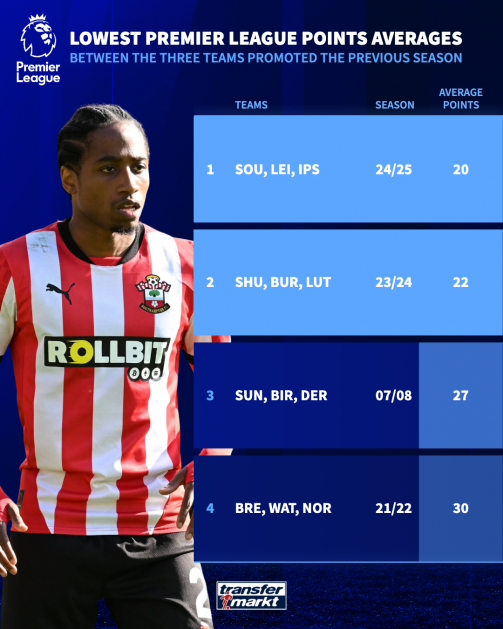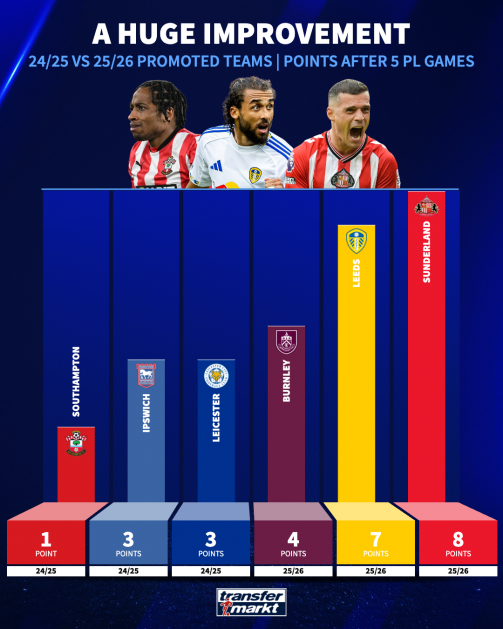Sunderland, Leeds & Burnley

©TM/IMAGO
In May 2024, for the first time since 1998 in the Premier League, all three teams that were promoted from the Championship the previous season were relegated. Sheffield United, Burnley and Luton all went straight back down. It was only the second time that event had ever occurred in the Premier League, after Crystal Palace, Barnsley and Bolton all went down in the 1997/98 campaign. Twelve months later and it happened again. Southampton, Ipswich and Leicester all faced the drop, and without much more than a whimper.

What sort of image does that bode for the Premier League? Is the gulf in quality between the English top-flight and the Championship bigger than ever before? And is the Premier League now becoming a closed shop only for the elite? This season, the division needed the promoted teams to put up a fight, and the early signs are good. Sunderland broke the record over the summer for the most money spent by a promoted side (€187.9m), whilst Burnley (€128.7m) and Leeds (€113.7m) also weren’t afraid to splash some cash. Five games into the season, and there is evidence to suggest that this unwanted trend may be in the process of being bucked.
24/25 & 25/26 Promoted sides records compared
Sunderland are currently seventh, Leeds are 12th and Burnley are 16th. Each of the trio have already won a game. You would have had to wait until November 10 last season to say the same, when Ipswich finally got their first win at Tottenham. In fact none of the promoted sides won a single game until October 19, and that was when Leicester beat fellow promoted outfit Southampton at St Marys. The sample size this term is too small to make huge conclusions, but there have been significant differences to the last campaign already.

Between them Sunderland, Leeds and Burnley already have 19 Premier League points this term. At the same stage last season, Leicester, Ipswich and Burnley had just seven points. There has been less fear, more impetus and a more solid tactical plan from each of the promoted trio. Thus far, they haven’t looked like walkovers. Between them they have conceded just 19 goals in 15 games, which when you consider that five of them came in Leeds’ 5-0 defeat at Arsenal, and the trio are adapting to the new league, is pretty good going. Last season they had conceded 25 at the same stage.
Why the Premier League needs a promoted team to stay up
As touched upon above, last two seasons have very much highlighted how hard it is for promoted teams to survive in the cauldron that is the modern Premier League. With so much money in the Premier League nowadays, the permanent elite is stretching from the traditional ‘Big six’ teams right down the division, with it increasingly harder for Championship teams to muscle in and become stalwart Premier League sides. Does it matter that much? Perhaps to some more than others.
Modern football is practically designed to support the elite and there’s clearly a portion of the Premier League’s audience who have little care about the diversity of the sides fighting in the division. But one of the great spectacles of the English game is it’s football pyramid, and the idea that the biggest clubs and the smallest sides all compete in the same vast structure, and that everybody can move up or move down according to form. But a pyramid has to have a somewhat smooth incline; if there are steep, almost unassailable steps, it takes away the structure’s ultimate strength – it’s competition and possibilities.
